A YouGov poll conducted earlier this month reveals a strong bond between Americans and their pets. Most people with pets consider their animals to be part of the family and think of themselves as a parent to them. Americans often seek comfort from their pets, sleep in the same bed, and have anxiety when they’re apart. Many people say they celebrate their pets’ birthdays and buy gifts for them on special occasions.
Part of the family
Of the 58% of Americans who say they have a pet (including 40% of Americans who have a dog and 32% who have a cat), nine in 10 consider their pet to be a part of their family. Many pet people – including 51% of those with dogs and 43% of those with cats – consider themselves their pet’s parent when asked to select from a list of relationship descriptors. (Because this was the most popular descriptor, we will refer to people with pets as “pet parents” throughout the rest of the article.) A significant share also consider their dog or cat to be their friend, many even their best friend. About one-third of people with dogs or cats consider themselves their pets' owners.
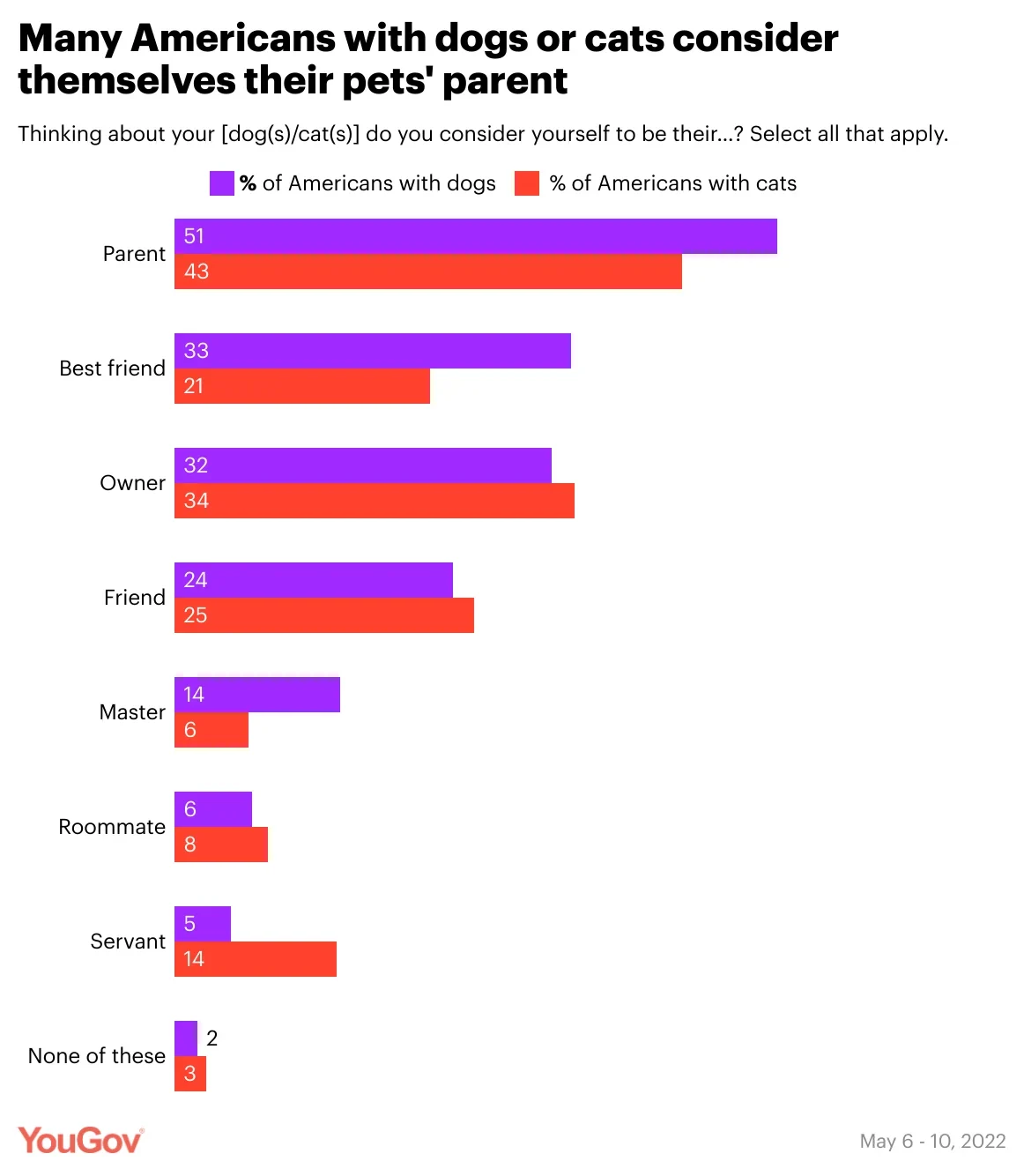
Not all Americans with pets feel they have the upper hand in these relationships. While almost no one considers themselves their dog’s “servant,” 14% of people with cats say they’re a servant to their cat.
In another question, we asked people with pets who is more in charge in their home: the pets or the people? While most (62%) say the people are in charge, 10% say the pets are in charge, and 25% say the pets and people are equally in charge. On this, too, people with cats were more likely to rank themselves lower than their pets compared to people with dogs.
Americans’ attitudes towards their pets also are reflected in what words they use to refer to them. Three-fourths of pet parents say they use the pronouns “he” or “she” to refer to their pet, rather than “it” or “they.” A 2009 poll found that almost half of people give their pets human-like names. According to our most recent survey, about one in three Americans with pets say they are “all for” giving pets human names, while half say they’re “OK with it” and 8% say they’re “not a fan.”
The impact of pets
We asked people with dogs and cats to tell us in their own words what impact dogs and cats have had on their lives. The quotes displayed below are drawn from answers to these questions; they may not be representative of the full range of responses.
When asked how dogs have impacted their lives, many dog parents highlighted their companionship, their unconditional love, and the emotional support they provide. Some people said dogs have given them purpose and a reason to get out of bed in the morning when they’re going through hard times, such as divorces, deaths of loved ones, bouts of depression, and other health challenges. While some people said that dogs keep them from feeling lonely or isolated, others mentioned the important role dogs play in their family lives, bringing joy to both younger and older generations. A number of people also cited the unique nature of dogs’ unconditional love, not caring about what a person looks like or how much money they have.
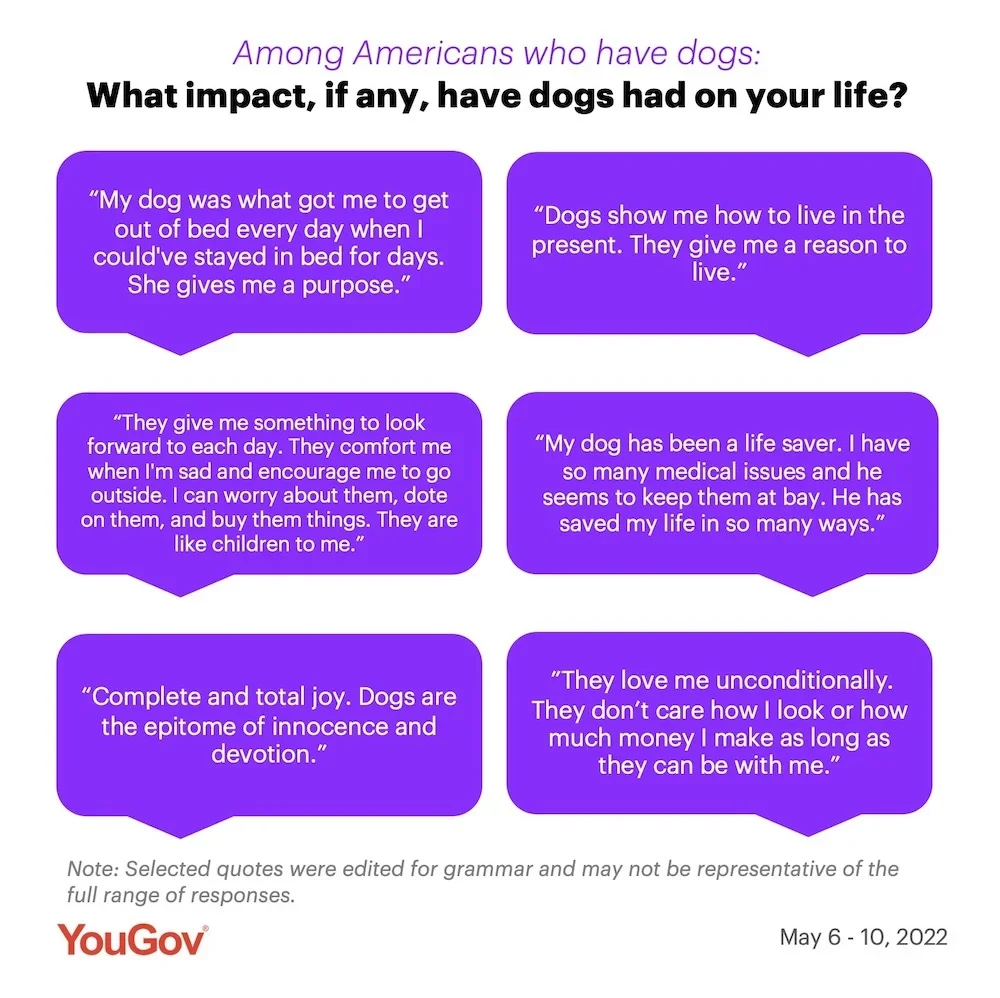
While many cat parents mentioned similarly strong bonds with their cats, there were some differences in how people with cats and dogs described their animal companions. Fewer cat parents than dog parents described a feeling of unconditional love from their cats, while a larger share of people with cats than of dog people said their animals can reduce their feelings of stress and anxiety. A significant number of people also highlighted the entertainment value cats offer them, regularly providing amusement and making them laugh. Others mentioned utilitarian benefits to having cats, such as their ability to act as pest control.
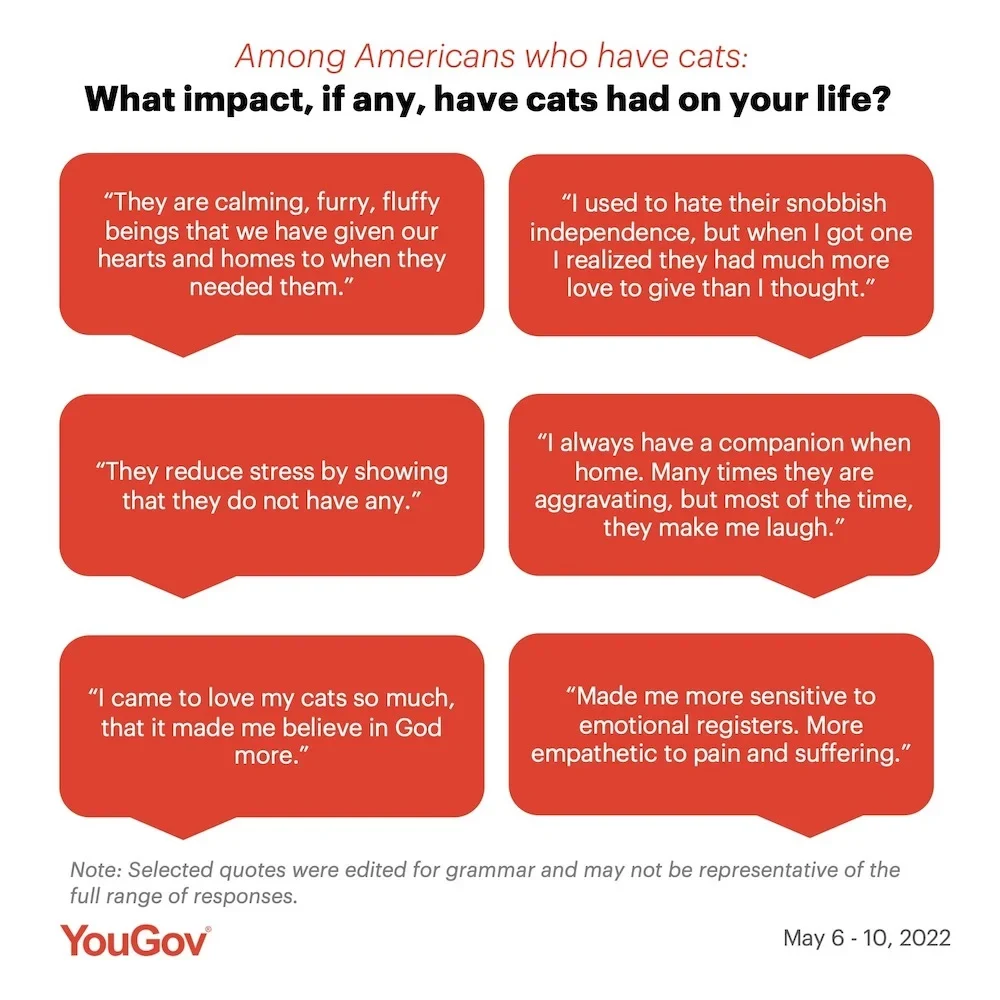
Love, comfort, and celebration
The vast majority of Americans believe that pets are capable of feeling love, and most dog and cat parents believe their pets love them. Over three-quarters of people with pets say they often seek comfort from their pets, and many (40%) feel anxiety when they are away from their pets during the day. Two-thirds of Americans with dogs and cats share their bed with their pets at night. Pets also function as conversation partners: More than half of dog and cat parents say they sometimes talk at length to their pets.
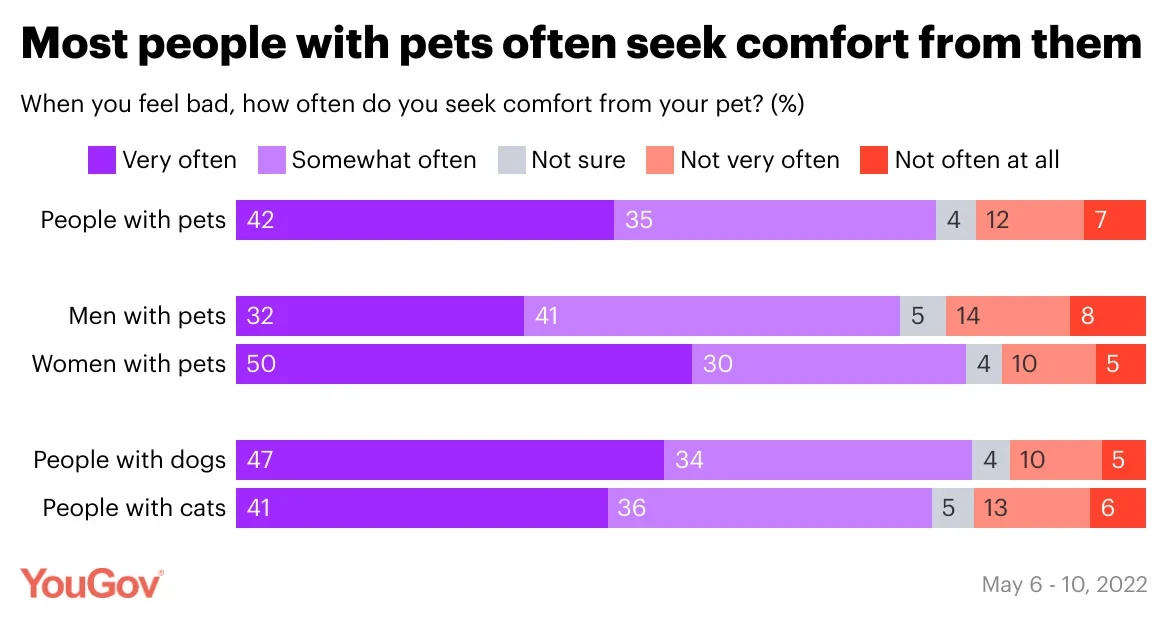
Most dog and cat parents (57%) buy their pets gifts for holidays and many (40%) even celebrate their pets’ birthdays. One in four dog or cat parents (25%) say they sometimes dress their pet up for holidays or events.
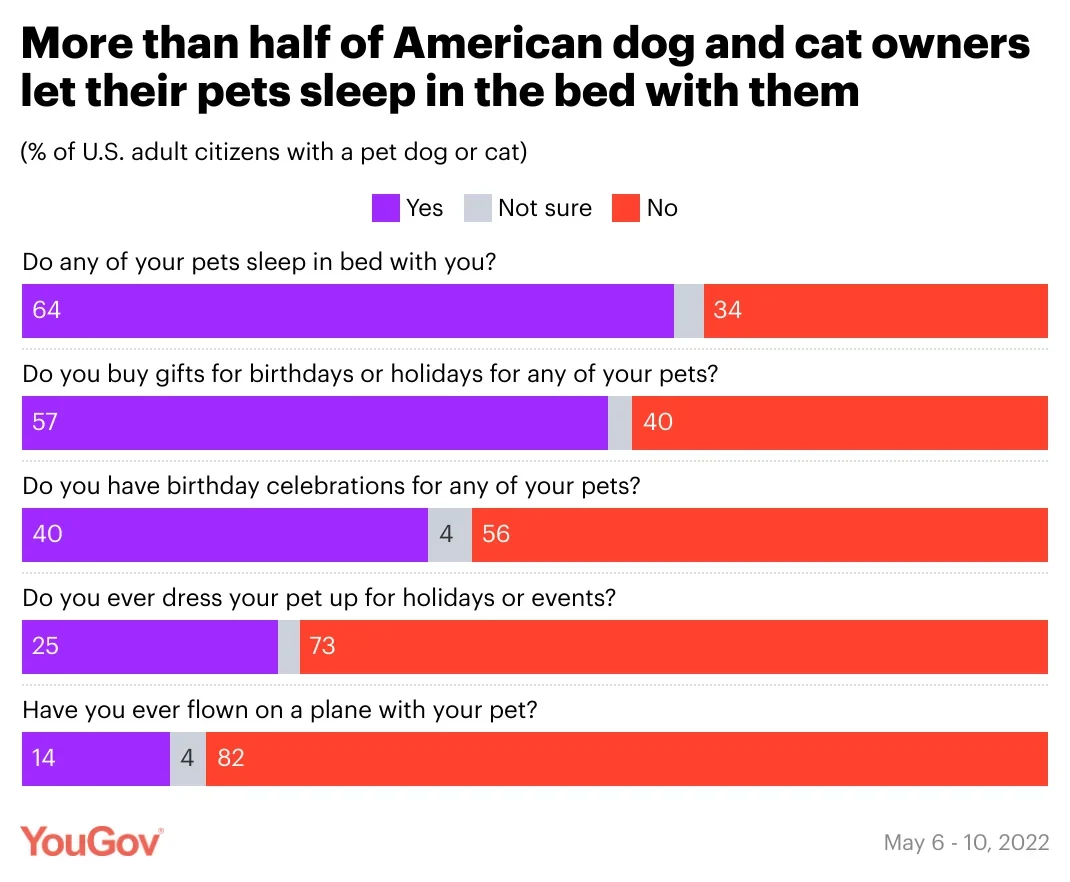
How much are Americans willing to pay to save their pet’s life? Of pet parents who responded to the question, more than half (55%) say they’d be willing to pay more than $1,000 to save their dog from a life-threatening ailment, while 43% say they would pay around $1,000 or less. Only 3% say they wouldn’t pay any amount. People with cats are willing to pay somewhat less to save their pet’s life: 42% say they’d pay over $1,000, 53% say they’d pay less than $1,000, and 5% say they wouldn’t pay any amount.
If their pet were to die, most people with pets are confident the pet would live on in the afterlife. More than half of pet parents believe that pets can go to heaven, and 95% of the pet parents who think this believe their own pets will go to heaven.
Identifying with pets
Americans are twice as likely to think of themselves as a “dog person” (40%) than as a “cat person” (20%). Many (31%) say they like cats and dogs equally and few (8%) say they don’t like either. People who currently have both dogs and cats are also twice as likely to say they’re a dog rather than a cat person, though most say they like both equally.
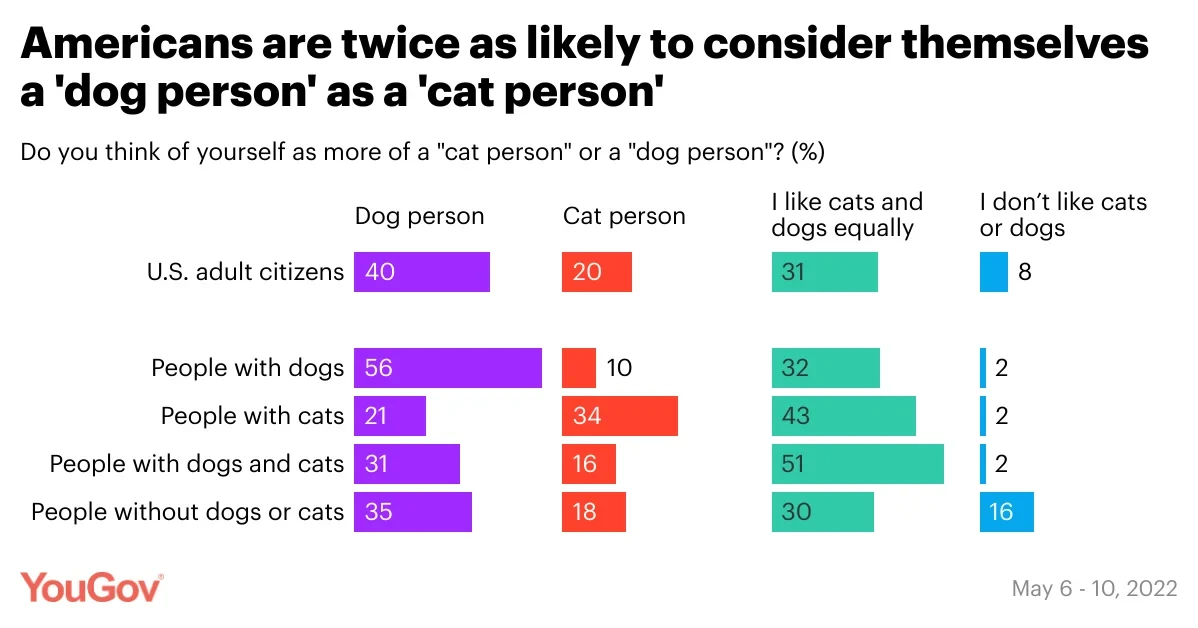
Regardless of which kind of animal they like better, most people think their personality is more like a dog than like a cat. While men are far more likely to say they’re like a dog than like a cat, women are about equally likely to say they’re more like a dog or more like a cat.
Many Americans see similarities between pets and their owners. A little more than half of people think pets usually share personality traits with their owners. Fewer (about one in three) say that pets physically resemble their owners.
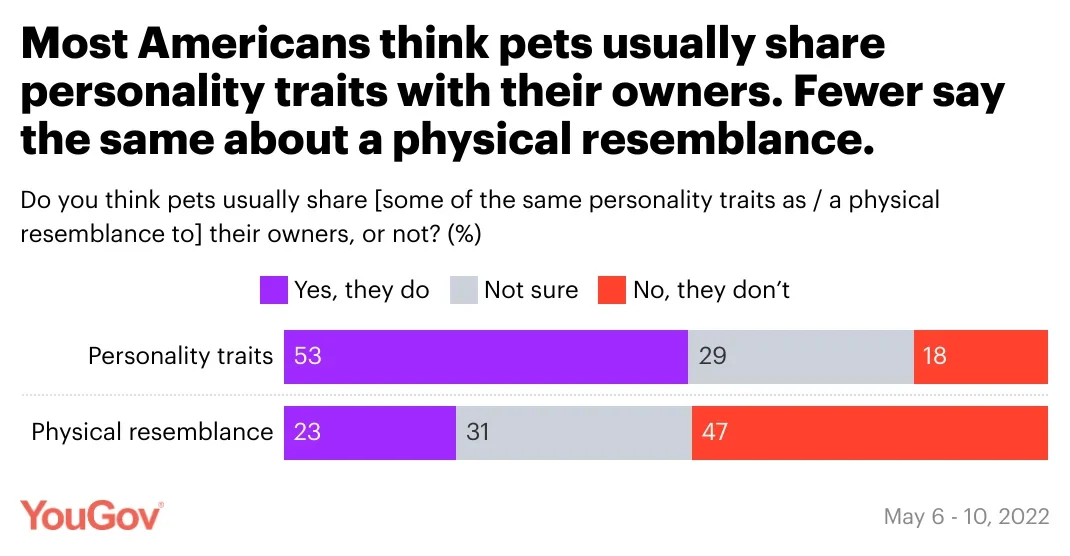
Does a dog’s breed predict their personality? A major study recently found that less than one-quarter of the differences in personality from dog to dog can be explained by genetics. Where do Americans stand on this question? Only 13% say breed is very predictive of personality, while 45% say it is somewhat predictive. Fewer say it is not very or not at all predictive (14% and 8%, respectively). Most people, however, do believe that some dog breeds are inherently more dangerous than others. It’s possible this belief could be based in part on assessing dogs' danger based on their physical characteristics rather than just their personality traits.
Most pet parents are skeptical of people who don’t like animals. About half (51%) say that people who dislike animals are less trustworthy than people who do like them, while 29% say they are about as trustworthy and 4% say they are more trustworthy. Only one-quarter of people without pets (25%) think people who don’t like animals are less trustworthy, though few (6%) view them as more trustworthy; many (30%) say they’re not sure.
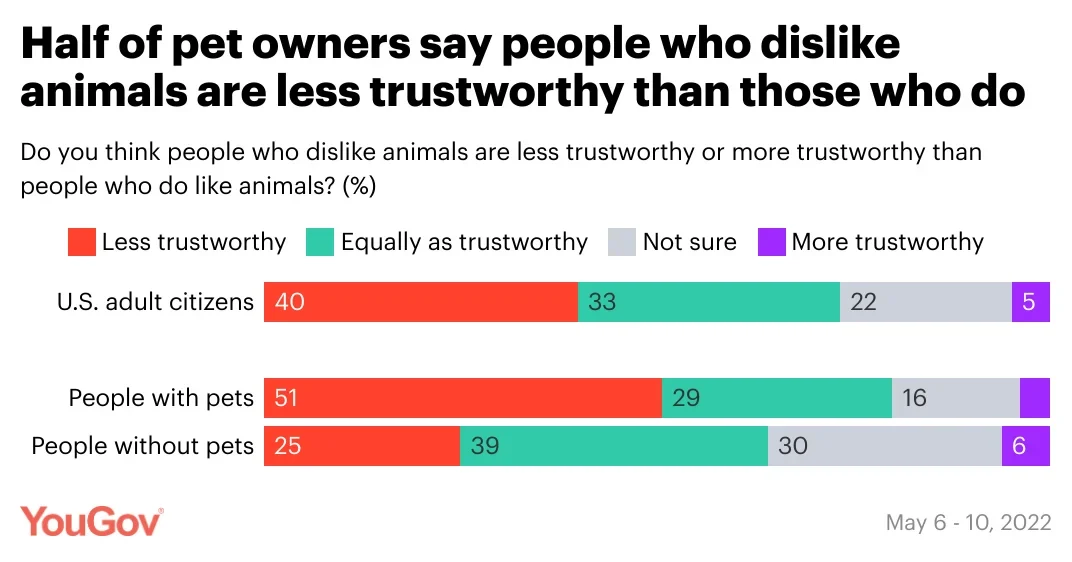
– Carl Bialik and Linley Sanders contributed to this article.
Related: Nearly half of Americans support strengthening laws around animal cruelty
This poll was conducted on May 6 - 10, 2022, among 1,000 U.S. adult citizens. Explore more on the methodology and data for this poll.
Image: Getty

















